DOWNLOAD ROUNDUP – OCTOBER 2011/1
Brian
Wilson
The September 2011/2 Roundup is here
and earlier editions can be found here.
As I was about to close this Roundup, I received details of
a new suite of programmes specifically designed for ripping,
cataloguing and playing classical music at future-proof bit-rates
up to 24-bit/358.2kHz; I’ve yet to encounter anything higher
than High Definition Tape Transfers’ 24/192. At present I’m
happy most of the time with wi-fi playing of downloaded and
ripped music via Squeezebox, but it has its limitations, in
that it can cope with 24-bit lossless downloads but only at
48kHz. I’m informed that when it down-samples 96kHz recordings
the result is actually inferior to 24/48 sound. Though I don’t
understand the technology, and I must admit that my septuagenarian
ears can’t tell the difference, I usually burn 24/96 recordings
to CDR via Winamp.
I haven’t had time to download and try the limited-time
demo which I received, but the suite looks interesting enough
and, at €39 or €49, inexpensive enough for me to include
a mention here and refer you to musichi.eu,
where you’ll find more details, including the demo download.
I’m pleased to see that Ian Lace shares my enthusiasm for
the John Wilson CD of music from the MGM Musicals, That’s
Entertainment, which I made my Download of the Month
in the September 2011/2 Roundup – see his Recording of the Month review.
I thought that Naxos had sorted the prices
of budget 2-CD sets on EMI and Virgin Classics at a uniform
£6.99, which is competitive with the price of the parent
CDs at around £7.65, but I’m amazed to see that several,
including Volume 2 of the Haydn London Symphonies (Beecham)
have reverted to an uncompetitive £13.98. One album of
CPE Bach Concertos, selling on CD for £7.65, is offered
in two different forms for £13.98 and a staggering £29.98
respectively. Until the prices are sorted out, I can’t
include any more reviews of these downloads.
Download
of the Month
Frederick DELIUS (1862-1934)
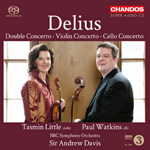 Concerto
for Violin, Cello, and Orchestra*† [21:43]
Concerto
for Violin, Cello, and Orchestra*† [21:43]
Violin Concerto* [25:28]
Concerto for Cello and Orchestra (edited by Sir Thomas BEECHAM
and Dr Eric FENBY)† [21:23]
Tasmin Little (violin)*
Paul Watkins (cello)†
BBC Symphony Orchestra/Sir Andrew Davis – rec. October 2010.
DDD/DSD
pdf booklet included.
CHANDOS CHAN5094 [68:59] – from theclassicalshop.net
(mp3, 16-bit and 24-bit/96kHz lossless and Studio Surround)
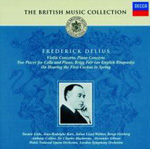 Violin
Concerto, RT vii/6* [24:23]
Violin
Concerto, RT vii/6* [24:23]
Piano Concerto in c minor, RT vii/4** [22:10]
Caprice and Elegy, for cello and chamber orchestra (piano),
RT vii/8^ [7:52]
On Hearing the First Cuckoo in Spring, tone poem for
orchestra (Pieces for small orchestra, No. 1), RT vi/19/1^^
[6:58]
Brigg Fair (An English Rhapsody), for orchestra, RT vi/16+
[15:30]
Tasmin Little (violin)*; Welsh National Opera Orchestra/Charles
Mackerras*/^^
Jean-Rodolphe Kars (piano); London Symphony Orchestra/Alexander
Gibson**
Julian Lloyd Webber (cello); Bengt Forsberg (piano)^
London Symphony Orchestra/Anthony Collins+ – rec.1953-1996.
ADD/DDD.
DECCA BRITISH MUSIC 470 1902 [76:53] – from passionato.com
(mp3)
There are two Downloads of the Month this time – one a new issue,
the other an item of back catalogue now available only as a
download. What these recordings have in common is Tasmin Little,
who is something of a pluralist in Delius, having recorded both
the Violin Concerto, as above, and the Double Concerto twice.
Her recording of the latter with Raphael Wallfisch was until
recently available on Classics for Pleasure, coupled with the
Cello Concerto and Paris, and conducted again by Mackerras.
The deletions axe seems to have fallen on both these earlier
recordings, making the passionato.com download and the new recording
all the more welcome.
If I marginally favour the slightly snappier earlier version
of the Violin Concerto with Mackerras, there is very little
in it; I’m content to let the couplings, excellent in both cases,
and/or the question of whether passionato.com’s very good mp3
will do or you must have one of the Chandos lossless versions,
decide the issue. If the 24-bit versions are too expensive for
you, the 16-bit will do very nicely – at £9.99 it’s reasonably
priced whereas the 24/96 at £15.99 and the Studio Surround
at £19.99 are more expensive than the SACD.
Discovery
of the Month
Peggy GLANVILLE-HICKS (1912-1990)
Etruscan Concerto (Promenade; Meditation; Scherzo) (1954)
[15:17]
Sappho – Final Scene (1963) [7:42]
Tragic Celebration (1966) [15:34]
Letters from Morocco for tenor and small orchestra (1952)
[14:16]
Caroline Almonte (piano); Gerald English (tenor); Deborah Riedel
(soprano).
Tasmanian Symphony Orchestra/Richard Mills, Antony Walker – rec. live 1993 and 2007. DDD
Pdf booklet with texts available from Buywell – here.
ABC CLASSICS 476 3222 [52:57] – from emusic.com
(mp3)
[see review
by Rob Barnett]
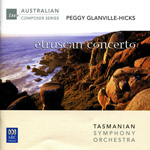 The
chief work, the Etruscan Concerto is very much of its
time (1954) and clearly evokes other composers in a way which
I can’t quite put my finger on – the notes mention Boulanger,
Copland, Harris and Lambert and Rob Barnett mentions Hovhaness,
which I think especially apt – yet without being in any sense
derivative. The Final Scene of Sappho, to words by Lawrence
Durrell, is also an attractive work – it reminded me of the
tone of Samuel Barber’s Knoxville, but again without
sounding derivative.
The
chief work, the Etruscan Concerto is very much of its
time (1954) and clearly evokes other composers in a way which
I can’t quite put my finger on – the notes mention Boulanger,
Copland, Harris and Lambert and Rob Barnett mentions Hovhaness,
which I think especially apt – yet without being in any sense
derivative. The Final Scene of Sappho, to words by Lawrence
Durrell, is also an attractive work – it reminded me of the
tone of Samuel Barber’s Knoxville, but again without
sounding derivative.
Tragic Celebration is an orchestral piece which achieves
what it says on the box – it’s ballet music on the theme
of Jephtha’s tragic vow to sacrifice the first person he
sees, which turns out to be his own daughter – without overdoing
the tragic mood. Letters from Morocco is another vocal
work, this time setting letters written to her by Paul Bowles,
with a hint of exotic Arabian rhythms in the manner of Holst’s
Beni Mora and Hovhaness again.
The performances by the soloists and Tasmanian Symphony Orchestra
are idiomatic, as far as I can judge – they certainly make a
strong case for all the music and, in any case, it’s Hobson’s
Choice, apart from the Naxos Classical Archives 1956 recording
of the Etruscan Concerto (9.80083,
with Vagn Holmboe’s Chamber Concerto No.10, not available
in the USA) unless an enterprising independent (Chandos? Hyperion?
Naxos?) joins the fray. RB especially liked Gerald English’s
contribution but, just to prove that we don’t always go
hand in glove, I thought him the least effective contributor.
At £5.04 or less, this is quite a bargain – the parent
CD sells for around £8.50 in the UK. Despite a bit-rate
which ranges from a measly 172kb/s to a more acceptable 234kb/s
the recording sounds perfectly decent. There are no notes, but
Buywell generously offer the pdf booklet to all comers – here.
Bargain
of the Month
Roy HARRIS (1898-1979) Symphony
No.3
American Symphony Orchestra/Leon Botstein
AMERICAN SYMPHONY ORCHESTRA [16:42] – from emusic.com
(mp3)
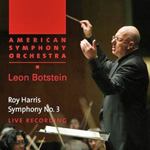 Roy
Harris’s one-movement Third Symphony has a directness of
appeal that he never quite equalled again. This live performance
may not be quite as magic as the front runners, of which the
most accessible, in the absence of either of Bernstein’s
recordings, is Marin Alsop’s on Naxos coupled with the
Fourth (8.559227 – see John Quinn’s review
of ‘an excellent disc’ and April 2010 Roundup) but
it’s not far behind. The recording is decent but a trifle
muted by comparison with the Naxos. Those who aren’t subscribers
to emusic.com, where it costs £0.42 or less, will find
the price at amazon.co.uk of £5.99 uncompetitive with
downloading the Naxos from classicsonline.com.
Roy
Harris’s one-movement Third Symphony has a directness of
appeal that he never quite equalled again. This live performance
may not be quite as magic as the front runners, of which the
most accessible, in the absence of either of Bernstein’s
recordings, is Marin Alsop’s on Naxos coupled with the
Fourth (8.559227 – see John Quinn’s review
of ‘an excellent disc’ and April 2010 Roundup) but
it’s not far behind. The recording is decent but a trifle
muted by comparison with the Naxos. Those who aren’t subscribers
to emusic.com, where it costs £0.42 or less, will find
the price at amazon.co.uk of £5.99 uncompetitive with
downloading the Naxos from classicsonline.com.
October
2011 releases from Beulah Extra
Among the ripe autumn harvest from Beulah for October – here – my favourites are Curzon’s Grieg and Böhm’s
Beethoven:
Ludwig van BEETHOVEN (1770-1827)
Symphony No.8 in F, Op.93 [24:09]
Vienna Philharmonic Orchestra/Karl Böhm – rec.1955? ADD/mono
BEULAH 6-9BX133 [24:09] – from eavb.co.uk
(mp3)
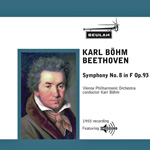 Like
the Seventh, Beethoven’s Eighth often languishes under
the misapprehension that he was marking time between the Pastoral
and the Choral symphonies. They may be much smaller-scale
than either of those masterpieces, but I often prefer Beethoven
in quieter mode – the Second and Fourth come into that category,
too. Böhm’s Beethoven and Mozart has all the virtues
of old-fashioned performance at its best, a quality which it
shares with Eugen Jochum and with Bruno Walter, whose mono recording
of the Eighth with the NYPO was my introduction to this work.
I didn’t find the playing slightly routine sounding, as
MM did in 1953, but then I didn’t have the heaven-opening
Beecham version for comparison, as he did.
Like
the Seventh, Beethoven’s Eighth often languishes under
the misapprehension that he was marking time between the Pastoral
and the Choral symphonies. They may be much smaller-scale
than either of those masterpieces, but I often prefer Beethoven
in quieter mode – the Second and Fourth come into that category,
too. Böhm’s Beethoven and Mozart has all the virtues
of old-fashioned performance at its best, a quality which it
shares with Eugen Jochum and with Bruno Walter, whose mono recording
of the Eighth with the NYPO was my introduction to this work.
I didn’t find the playing slightly routine sounding, as
MM did in 1953, but then I didn’t have the heaven-opening
Beecham version for comparison, as he did.
The recording is good for its date and sounds well enough in
the Beulah transfer not to impede my enjoyment. One small query:
the date is given as 1955, but I believe that this is the same
performance that was released in 1953.
It’s now possible to build up a decent library of historic
Beethoven symphony performances from Beulah – find them here.
Edvard GRIEG (1843-1907)
Piano Concerto in a minor, Op.16
Clifford Curzon; London Symphony Orchestra/Anatole Fistoulari – rec.1951. ADD/mono
BEULAH 6-8BX7 [30:49] – from eavb.co.uk
(mp3)
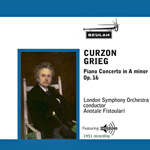 Bearing
in mind the fact that Clifford Curzon’s stereo remake with
Øivin Fjeldstad was the first recording of this concerto
that I owned, I was surprised to discover a somewhat lukewarm
reception for this 'nearly excellent’ earlier version in
1952, with soloist and recording coming in for some stick and
only Fistoulari and the orchestra escaping. Fistoulari’s
contribution is certainly praiseworthy, right from as jaunty
an opening as I’ve ever heard, and Curzon is somewhat tentative
to start with, but matters soon improve. This may not be quite
the Curzon whose contributions to the recorded repertoire I
revere, but it’s not far short and I know that many prefer
it.
Bearing
in mind the fact that Clifford Curzon’s stereo remake with
Øivin Fjeldstad was the first recording of this concerto
that I owned, I was surprised to discover a somewhat lukewarm
reception for this 'nearly excellent’ earlier version in
1952, with soloist and recording coming in for some stick and
only Fistoulari and the orchestra escaping. Fistoulari’s
contribution is certainly praiseworthy, right from as jaunty
an opening as I’ve ever heard, and Curzon is somewhat tentative
to start with, but matters soon improve. This may not be quite
the Curzon whose contributions to the recorded repertoire I
revere, but it’s not far short and I know that many prefer
it.
The recording is somewhat hollow sounding, but by no means intolerable – not at all bad for its age and Beulah’s magic has eradicated
the surface noise. By the finale either my ear had adjusted
or the sound had much improved. There’s a rival version
from Naxos Historical Archives on 9.80318, coupled with
Falla’s Nights in the Gardens of Spain, with Enrique
Jorda, also from 1951. (Download from classicsonline.com
for £1.99 or stream from Naxos Music Library. Not
available in the USA). With more music for your money, including
a version of the Falla that may not be ideal but is worth hearing,
you may prefer the Naxos, unless you live in the USA or somewhere
else with copyright lasting more than 50 years, but I think
that a little more care over the transfer has been taken at
Beulah.
The stereo version received a much more fulsome welcome – ‘Curzon
at his best’ – so perhaps we might be offered that from
Beulah or High Definition Tape Transfers in the near future.
It’s not currently available on a single CD, though passionato.com
have it in mp3 and lossless, coupled with Fjeldstad’s Peer
Gynt Suites (Decca Classic Sound 448 5992: see below).
Certainly the 1951 release offered poor value, with just the
Grieg Concerto taking up a full 12" LP at 39/6 (LXT2627),
though later Falla’s Nights in the Gardens of Spain
were added on LXT5165. When the stereo remake appeared, there
was a choice between a programme including Franck’s Symphonic
Variations and the Litolff Scherzo on 12" at 38/- or (later)
just the Grieg Concerto on a 10" LP for 18/-. That figure
of 18/- would represent something like £25+ in today’s
terms, so Beulah’s asking price becomes a real bargain,
especially when seen in that context.
The other big warhorse concerto this month is
Pyotr Ilyich TCHAIKOVSKY Piano Concerto No.1 in b
flat minor, Op.23, from a 1955 Decca recording played by Julius
Katchen with the London Symphony Orchestra and Pierino Gamba
on 1-3BX142
[31:33]. Though not very well received at the time, the performance
later became something of a classic, but the recording has not
survived the passing years very well – it wasn’t even very
good for its own time and, though Beulah have surely improved
the sound I remember hearing on the Ace of Clubs reissue, the
orchestra still sounds thin and ill-defined and the piano desiccated.
Many of Katchen’s other recordings remain viable*, but
there are too many rivals, even among recordings from the 1950s,
to give this a strong recommendation, either in this Beulah
release or in that on Naxos Historical Archives 9.80467,
where the original coupling with Liszt’s Hungarian Fantasy
is preserved. Now if Beulah were to reissue Katchen’s recording
of the two Liszt concertos, with Ataulfo Argenta and the LSO
…
* The 4-CD set of Beethoven Piano Concertos, Choral Fantasia
and Diabelli Variations on Decca 475 8449, for
example, from passionato.com
(mp3): see November 2010 Roundup.
Beulah already had performances of Wolfgang
Amadeus MOZART’s Piano Concerto No.23 in A,
K488, with Denis Matthews (1BX42) and Clifford Curzon
(with Boyd Neel, 1945: 1-3BX101) as soloists. They now
add a recording made by Annie Fischer with Sir Adrian
Boult and the Philharmonia Orchestra in stereo in 1960.
(5-7BX130 [25:45] – here.)
This recording was released with Piano Concerto No.20 on the
reverse, previously reissued by Beulah on 1-3BX130, which I
reviewed in the May 2011/1 Roundup.
If anything, I love K488 more than any other Mozart Piano Concerto
and Fischer’s performance is all that I expected after
hearing her recording of K466. The accompaniment is good – but
did I hear an odd fluffed note soon after the opening? – Boult
directs with his usual finesse and the recording still sounds
well in this transfer. A fine alternative to the Curzon – see
January 2011 Roundup,
also the May 2010 Roundup
for the later stereo version with Benjamin Britten: ideally
you need both Curzon versions and Fischer.
The Busch Quartet from 1935-1938 feature in the music of Franz
SCHUBERT: the String Quartet No.8 in B flat (D112)
on 9-12BX152
[39:53], the String Quartet No.14 in d minor (D810) on 17-20BX152
[24:53], the String Quartet No.15 in G, Op.168 (D887), on 13-16BX152
[32:59] and Adolf Busch and Rudolf Serkin in the Piano Trio
No.2 in E flat, Op.100 (D929), on 5-8BX152
[38:22]. These recordings are also available as a double
album from iTunes
as 2-3PD52
for a very reasonable £7.99 or $9.99.
When these performances were reissued on an EMI album in 1987,
they were described by Robert Layton as classic and indispensable,
a treasury of musical wisdom. I see no reason to demur now unless
you require all the repeats to be played, in which case you
need to turn, for example, to the Florestan Trio, who also include
both versions of the finale of the Piano Trio No.2 (Hyperion
CDA67347).
Of course the sound is dry but, in this transfer, perfectly
acceptable, and the surface noise has been nicely cleaned up
with no loss.
An excellent supplement to modern recordings by the likes of
the Beaux Arts Trio (Philips), the Florestan Trio (Hyperion),
the Kodály (Naxos) and Belcea (EMI) Quartets. It’s less
expensive, too, in terms of pence per minute, than the EMI GROC
reissue of Quartets 14 and 15.
I’ve already reviewed Felix MENDELSSOHN
Elijah, recorded by Sir Malcolm Sargent with
the Huddersfield Choral Society and the RLPO as released by
Beulah on iTunes. The same recording also comes on 22-23BX13.
Please refer to the September 2011/2 Roundup
for the review.
Two reissues of GRIEG: the
Lyric Suite from Sir Malcolm Sargent and the National
Symphony Orchestra (rec.1946) on 20BX13 [14:35] and Peer
Gynt Suites Nos. 1 and 2 from the LPO under Basil Cameron
(rec.1949) on 7-14BX27 [30:32].
There are several reissues of music by Sir
Arthur SULLIVAN. Sir Malcolm Sargent conducts the
Pro Arte Orchestra with customary aplomb in the Iolanthe
Overture on 21BX13 [7:20], a 1959 stereo recording which sounds
a trifle thin but has otherwise come up well. Find it here.
This is taken from an HMV Concert Classics recording (XLP20003)
which is quite a collectors’ item and from which I hope that
we shall have some more reissues.
When it comes to HMS Pinafore sung in Danish in 1958
under the direction of Arne Hammelboe, better known for his
performances of Lumbye, the ‘Danish Strauss’, as den
gode Frigat Pinafore (2BX157 [26:42]), I’m left
with the question which you may recall Mr Weasley asked Harry
Potter concerning a rubber duck: what’s it for? The performances
are lively enough, however. The same applies to Trial by
Jury, an even more quintessentially English work, as Retten
er sat on 1BX157 [13:24].
I may not be clear about the purpose of Gilbert and Sullivan
in Danish, but I am clear about that of:
Sadler’s Wells Voices: Historic recordings made between 1933
and 1960
WAGNER Lohengrin (Act1:
By Heaven’s behest) Live recording in Sadler’s Wells Theatre
Oct 1933 [2:24]
GOUNOD Faust (Garden
Scene) 1948 recording [12:55]
MASCAGNI Cavalleria Rusticana
(Easter Hymn) 1939 recording [4:43]
BRITTEN Peter Grimes
(Act II : Glitter of waves and glitter of sunlight) 1948 recording
[13:51]
BIZET Carmen (Habanera
and Seguidilla) 1948 recording [3:28 + 2:06]]
VERDI Simon Boccanegra
(Act I: Nobles! Plebeians!) 1948 recording [8:46]
SMETANA Bartered Bride
(Act II: O dream of love) 1947 recording [4:41]
OFFENBACH Orpheus in
the Underworld (Act II: Fly duet) 1960 stereo recording
[6:12]
Johann STRAUSS II Die
Fledermaus (Act II: Brother mine and sister mine) 1960 stereo
recording [3:59]
Joan Cross, June Bronhill, Jeanne Dusseau, Victoria Elliott,
Nancy Evans, Joyce Gartside, Anna Pollak, Marion Studholme,
Constance Willis, Harry Bridle, Howell Glynne, Booth Hitchen,
James Johnston, Arnold Matters, John Heddle Nash, Frederick
Sharp, Eric Shilling, Henry Wendon, Alexander Young; Sadler’s
Wells Chorus and Orchestra/Warwick Braithwaite; Lawrance Collingwood,
Alexander Faris, Michael Mudie, Vilem Tauský
Peter Pears, Joan Cross; Chorus and Orchestra of the Royal Opera
House/Reginald Goodall
Edith Coates; London Symphony Orchestra/Walter Goehr
Joan Hammond, Owen Brannigan, Heddle Nash, Frederick Sharp;
Philharmonia Orchestra/Lawrance Collingwood; Walter Susskind
BEULAH 1PD43 [63:05] – available from iTunes from 04
October 2011. Details from www.eavb.co.uk.
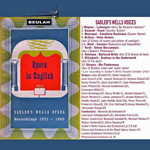 These
recordings date from the glory days of Opera in English at Sadler’s
Wells before the ENO transferred to the Coliseum to continue
the good work. It represents the varied repertoire that was
presented there over three decades; my only reservation is that
I would have liked to have heard longer extracts from, for example,
Offenbach’s Orpheus. We’ve already had the Overture from
that recording on Beulah and the Fly Duet here is very welcome,
but how about giving us the complete LP of highlights in a better
transfer than the (acceptable) one on Past Classics? Much of
the material here was reissued on a 3-LP set in 1972 but has
remained unobtainable since then, so the Beulah reissue is most
welcome and the transfers sound very well indeed.
These
recordings date from the glory days of Opera in English at Sadler’s
Wells before the ENO transferred to the Coliseum to continue
the good work. It represents the varied repertoire that was
presented there over three decades; my only reservation is that
I would have liked to have heard longer extracts from, for example,
Offenbach’s Orpheus. We’ve already had the Overture from
that recording on Beulah and the Fly Duet here is very welcome,
but how about giving us the complete LP of highlights in a better
transfer than the (acceptable) one on Past Classics? Much of
the material here was reissued on a 3-LP set in 1972 but has
remained unobtainable since then, so the Beulah reissue is most
welcome and the transfers sound very well indeed.
Only the sound of the 1933 Wagner and that of Mascagni in 1939
require a deal of tolerance and Beulah have ensured freedom
from surface noise even there; everything else sounds very good
for its age. My most vivid memory of the Wells is of hearing
Janet Baker in the Handel Opera Society production of Orlando
in 1966 of which, sadly, I don’t think a recording was ever
made, unless one of our readers has a pleasant surprise for
me.
The highlights of this Beulah release for me are the substantial
chunk of Peter Grimes with Britten’s original Ellen
Orford and Peter Grimes together with Reginald Goodall, who
conducted the 1945 premiere, and the Offenbach excerpt. For
all my reservations about the timbre of Peter Pears’ voice,
he remains the Grimes and though Joan Cross as
the housekeeper in The Turn of the Screw is still, thankfully,
available, I can’t find any other trace of her Ellen Orford
in the current catalogue. If you feel inspired to move on to
the complete Peter Grimes, passionato.com have the Decca Originals
recording conducted by Benjamin Britten himself in mp3 (£12.99)
or lossless (£15.99) on 475 7713 here.
If you must have a bargain, emusic.com offer the Past Classics
version of the same recording for just £1.26 here,
but I can’t vouch for the quality of the transfer.
And two recordings from Beulah’s back catalogue which I haven’t
yet included in a Roundup:
Mily BALAKIREV (1837-1910)
Russia, Symphonic Poem* [11:35]
Nikolay RIMSKY-KORSAKOV
(1844-1908) Capriccio Espagnol, Op.34**
[13:41]
Hallé Orchestra*; London Philharmonic Orchestra**/Sir
Hamilton Harty – rec.1928**, 1933* (mono)
BEULAH 1BX25*, 2BX25** [11:35+13:41] – from Beulah Extra
(mp3) here.
These transfers, though rather dry-sounding, belie the dates
of the original recordings. The Balakirev, especially, apart
from some odd patches of light surface noise, might almost be
from an early-50s LP. The change to electrical recording between
the dates of the two tracks makes all the difference. It’s
the lively Balakirev performance, too, that is the winner for
me. I haven’t heard the Dutton transfer of this recording,
originally made as part of Columbia’s History of Music,
but I can’t imagine that it’s any improvement on what
Beulah have achieved. Now will someone please restore the wonderful
Beecham recording of Balakirev’s First Symphony?
Max BRUCH (1838-1920) Violin
Concerto No.1 in g minor
Alfredo Campoli; New Symphony Orchestra/Royalton Kisch – rec.
1951 (mono)
BEULAH 1-3BX10 [25:19] – from Beulah Extra here.
This recording enjoyed a brief new lease of life, coupled with
Campoli’s recording of the Mendelssohn Concerto, in electronic
stereo, on the Decca Eclipse label in 1969. By then, of course,
the recording sounded rather dated and the bogus stereo did
little to improve matters. Despite Beulah’s careful re-mastering,
you wouldn’t choose this version for its recording quality,
though the affectionate but not over-indulgent performance merits
hearing and the imbalance which placed the soloist too forward
in the original pressings, at least in the opinion of the Gramophone
reviewer, HF, seems to have been quietly corrected.
***
Robert PARSONS (c1535-1572)
Domine, quis habitabit? [5:12]
Peccantem me quotidie [3:44]
Holy Lord God Almighty [3:48]
Deliver me from mine enemies [2:39]
Retribue servo tuo [8:04]
Solemnis urgebat dies’Iam Christus astra ascenderat’
[5:39]
Magnificat [13:15]
Libera me, Domine [7:31]
Credo quod redemptor [3:32]
O bone Jesu [11:42]
Ave Maria [4:56]
The Cardinall’s Musick (Amy Haworth, Rebecca Hickey, Carys
Lane, Cecilia Osmond (soprano); Patrick Craig, David Gould,
Rebecca Outram, Caroline Trevor (alto); William Balkwill, Mark
Dobell, George Pooley, Julian Stocker, Simon Wall (tenor); Robert
Evans, Robert Rice (baritone); James Arthur, Robert Macdonald,
Stuart Young (Bass))/Andrew Carwood
Pdf booklet included with texts and translations
HYPERION CDA67874 [70:07] – from hyperion-records.co.uk
(mp3 and lossless)
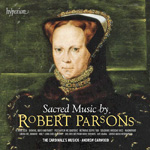 This
would have been a very strong candidate for Download of
the Month had I not already made my selection: instead,
I shall be considering it for one of my Recording of the Year
choices. If there remained any lingering doubts about the high
quality of Robert Parsons’ music after the Voces Cantabiles
recording (Naxos 8.570451 – see review,
review
and review)
this new release from Hyperion should dispel them. Like Tallis
and Byrd his productive career straddled the militant Protestantism
of Edward VI*, the return to Rome of Mary I, whose portrait
features on the cover, and the modified Anglicanism of Elizabeth
I, so that we have settings in Latin and English here. Many
of the Latin settings could have featured as the anthem in cathedral
and collegiate churches even in the two Protestant reigns and
the English settings are, if anything, preferable to those of
Tallis and approaching the quality of Byrd’s (English)
Great Service.
This
would have been a very strong candidate for Download of
the Month had I not already made my selection: instead,
I shall be considering it for one of my Recording of the Year
choices. If there remained any lingering doubts about the high
quality of Robert Parsons’ music after the Voces Cantabiles
recording (Naxos 8.570451 – see review,
review
and review)
this new release from Hyperion should dispel them. Like Tallis
and Byrd his productive career straddled the militant Protestantism
of Edward VI*, the return to Rome of Mary I, whose portrait
features on the cover, and the modified Anglicanism of Elizabeth
I, so that we have settings in Latin and English here. Many
of the Latin settings could have featured as the anthem in cathedral
and collegiate churches even in the two Protestant reigns and
the English settings are, if anything, preferable to those of
Tallis and approaching the quality of Byrd’s (English)
Great Service.
The performances are all that we have come to expect from Andrew
Carwood and his team, the recording, especially in lossless
form, does them full justice, and the notes are of Hyperion’s
usual excellent standard. There is some overlap with the Naxos,
but the two are largely complementary; the latter contains more
of Parsons’ English settings.
* as noted in the Hyperion booklet, there is no firm evidence
that he was active in the reign of Edward VI.
Wolfgang Amadeus MOZART (1756-1791)
Piano Concerto No. 9 in E flat ‘Jeunehomme’, K271
[27:47]
Piano Concerto No.12 in A, K414 [21:49]
Rondo in A, K386 [7:55]
Ronald Brautigam (fortepiano); die Kölner Akademie/Michael
Alexander Willens
BIS-SACD-1794 [58:36] – from eclassical.com
(mp3, 16- or 24-bit lossless) or stream from Naxos Music
Library
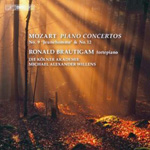 Is
this a travesty as one reviewer has suggested or a 5+5-star
special as another maintains? The answer will depend on your
taste in approaches to Mozart: if you don’t like fortepianos
– and this one is not the most endearing I’ve ever
heard – and/or small period orchestras, stay clear. If,
on the other hand, you’re prepared to listen with an open
mind, though you may not rise to the full 5+5 and you may well
wish to have at least one less radical recording in your collection,
there is much to enjoy here. The Jeunehomme concerto
– so named after Mozart’s pupil who was its dedicatee
– was his first on a reasonably large scale, so you really
need something like one of Brendel’s performances as a
reminder that Brautigam and Willens don’t have the only
answer – the early version on the budget Alto label, which
I reviewed some time ago, will do well enough. (ALC1047,
with Concerto No.14 and Sonata No.8 – Bargain of
the Month: see review:
download from classicsonline.com here).
Is
this a travesty as one reviewer has suggested or a 5+5-star
special as another maintains? The answer will depend on your
taste in approaches to Mozart: if you don’t like fortepianos
– and this one is not the most endearing I’ve ever
heard – and/or small period orchestras, stay clear. If,
on the other hand, you’re prepared to listen with an open
mind, though you may not rise to the full 5+5 and you may well
wish to have at least one less radical recording in your collection,
there is much to enjoy here. The Jeunehomme concerto
– so named after Mozart’s pupil who was its dedicatee
– was his first on a reasonably large scale, so you really
need something like one of Brendel’s performances as a
reminder that Brautigam and Willens don’t have the only
answer – the early version on the budget Alto label, which
I reviewed some time ago, will do well enough. (ALC1047,
with Concerto No.14 and Sonata No.8 – Bargain of
the Month: see review:
download from classicsonline.com here).
K414 is much better suited to the small-scale treatment –
indeed it’s one of the concertos of which Mozart himself
made a chamber-scale version* – and this recording proves
hugely successful. Yes, there’s occasional edginess to
the strings, paradoxically emphasised by the quality of the
recording, but it didn’t spoil my enjoyment.
* Recorded in that version by Brendel and the Alban Berg Quartet
on EMI – download from classicsonline.com – 0724355696250,
with Piano Quartet No.2, here – or stream from Naxos Music
Library.
The old adage is true here: de gustibus non est disputandum
– there’s no accounting for taste. I thought the recent
Pletnev PentaTone recording of Tchaikovsky’s Fifth Symphony
thoroughly off-message and I see that my MusicWeb colleague
Brian Reinhart agrees with me – 13th out of 13 in his collection:
see review
– but it has recently been chosen not just as a 5+5-star
offering but as Recording of the Month. If you’re torn
between the two opposing views of this Mozart recording, listen
to the substantial (8-minute) sample on the eclassical.com link
which I’ve given above. You can’t beat eclassical.com’s
pricing system – just $6.90 for mp3 and 16-bit lossless
or $10.35 for the 24-bit. Buy the 24-bit and you can come back
later for the mp3 for your mp3 player.
Richard WAGNER (1813 -1883)
Die Meistersinger von Nürnberg, WWV96, an orchestral
tribute (Symphonic compilation, arranged 2005 by Henk de
VLIEGER (b. 1953)) [47:51]
Eine Faust-Ouvertüre, WWV59 (1840, rev.1855) [11:03]
Deux Entreactes tragiques (Performing version, 1996,
by Henk de VLIEGER after compositional sketches from
1832) [12:26]
Overture to Columbus, WWV37 (1835, edited 1907 by Felix
MOTTL (1856 – 1911) as concert overture with the title
Christoph Columbus) [8:05]
Royal Scottish National Orchestra/Neeme Järvi
Rec Royal Concert Hall, Glasgow; 17 – 19 August, 2010.
DDD/DSD
CHANDOS CHAN5092 [79:54] – from theclassicalshop.net
(mp3, 16-bit and 24-bit/96kHz lossless and surround sound).
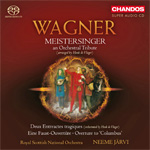 Chandos
have produced several of Henk de Vlieger’s orchestral realisations
of Wagner operas. This kind of ‘Wagner without tears’
is far from new: bleeding chunks of the Ring cycle are
often performed, such as the Ride of the Valkyries and Magic
Fire Music from die Walküre and Siegfried’s
Journey to the Rhine from Götterdämmerung;
the Venusberg music is the best known part of Tannhäuser,
the Good Friday spell of Parsifal and the Prelude and
closing Liebestod of Tristan und Isolde, played together
as one piece, turn one of the longest operas into one of the
shortest on record.
Chandos
have produced several of Henk de Vlieger’s orchestral realisations
of Wagner operas. This kind of ‘Wagner without tears’
is far from new: bleeding chunks of the Ring cycle are
often performed, such as the Ride of the Valkyries and Magic
Fire Music from die Walküre and Siegfried’s
Journey to the Rhine from Götterdämmerung;
the Venusberg music is the best known part of Tannhäuser,
the Good Friday spell of Parsifal and the Prelude and
closing Liebestod of Tristan und Isolde, played together
as one piece, turn one of the longest operas into one of the
shortest on record.
What Henk de Vlieger have done goes beyond these bleeding chunks,
however, in an attempt to produce an orchestral synthesis of
a complete opera: The Ring – an orchestral adventure
(CHSA5060 – see review
by Dan Morgan), Parsifal – an orchestral quest (CHSA5077
– see review
by Simon Thompson) and Tristan und Isolde – an orchestral
passion (CHSA5087 – see review
by Rob Barnett). The aim of the process for die Meistersinger,
presenting a symphonic whole rather than a potpourri,
is well explained in Emanuel Overbeeke’s notes in the booklet,
included in the original Dutch as well as in translation.
Essentially the aim is the same as on previous recordings, but
these orchestral syntheses have met with mixed reviews here
and elsewhere: veteran reviewer Edward Greenfield thought that
the Ring conflation worked remarkably well, but our own
Dan Morgan was underwhelmed by it, and Simon Thompson was not
much more enthusiastic about the Parsifal. The Tristan
recording seems to have come off best, holding Rob Barnett’s
attention more than Wagner normally does.
Henk de Vlieger starts with a real advantage in the case of
die Meistersinger von Nürnberg in that the opening
Prelude and that to Act III are established concert pieces which
make perfect sense when played on their own. Equally, since
this is a more light-hearted work – Wagner’s equivalent
of Verdi’s Falstaff, if you like – there’s
less of the high ground for us Wagnerites to defend, so that
a potpourri of the kind that de Vlieger has sought to
avoid, perhaps with the Offenbach/Rosenthal Gaîté
Parisienne in mind, might not have been too objectionable.
Nor is there one absolutely clear winner among recordings of
the opera to point to as definitive in terms of tempo and the
like, though most of us will have a firm favourite – in
my case the stereo Karajan, recently reissued on EMI 6407882*;
for all that I recognise the superiority of the earlier mono
version (Naxos Historical 8.110872/5), the recording
requires too much tolerance.
* download from classicsonline.com for £9.99: 5099964078854
– here:
no libretto but, at £9.99, keenly priced.
In the two preludes Järvi judges the pace very nicely –
none of the tempo problems which Dan Morgan noted in the Ring
compilation: the opening Vorspiel (9:25) comes within
two seconds of the stereo Karajan (9:27); both are a little
slower than the mono Karajan (9:11) and all three are a fraction
faster than his recording of the same piece on his EMI recording
of Wagner Overtures and Preludes (9:34)**. The same is generally
true elsewhere and, at the risk of upsetting Wagnerites who
are more serious about their man than I am, it was only really
in Walter’s Preislied that I missed the vocal contributions.
In compensation for any loss, I noted some of the felicities
of Wagner’s orchestral writing that normally go unnoticed.
** download from classicsonline.com: 0724347689659 – here.
The inclusion of some rarities adds to the appeal of this recording,
not least the Faust Overture, which inevitably invites
comparison with Liszt’s Faust Symphony, a comparison
from which the less well known Wagner emerges far from defeated.
Most of the currently available recordings are of a certain
vintage, so the new recording is very welcome.
The two Entreactes (sic) are pretty small beer; I would
have had real difficulty in identifying them as the work of
Wagner. Closer to the echt-Wagner mode is the final work,
the overture to Theodor Apel’s popular play of the 1830s
about Christopher Columbus. There’s only one other version
in the current catalogue, an early Naxos recording with Alexander
Rahbari and the Malaga Philharmonic Orchestra. The neglect is
unjustified, though one wouldn’t place it on the top ten
list of Wagner works, and the performance here makes a strong
case for it.
I listened to this recording in the 16-bit lossless download
format, equivalent to the CD layer of the SACD, burning the
result to CDR and printing out the booklet to recapture the
effect of holding the physical disc in my hand. I thought the
recording just slightly lacking brightness at first, but a small
boost of volume helped considerably and I think, in any case,
that the lack of voices where the memory expects to hear them
contributes mainly to the illusion. I didn’t notice the
same problem in the purely orchestral works. Sound buffs with
large bankrolls may wish to investigate the Studio Surround
version in 24-bit flac, though it doesn’t come cheaply,
at £19.99 a throw.
I approached this recording with some apprehension in the light
of reviews of earlier releases. In the event I enjoyed the whole
thing much more than I had anticipated. I think that most Wagnerites
who thought those earlier arrangements lacking will be more
tolerant of the new recording – and, probably, some non-Wagnerians
who find themselves enjoying the Prelude as a separate item
will also enjoy it.
Edvard GRIEG (1843-1907)
Peer Gynt – excerpts [39:23]
Piano Concerto in a minor, Op.16 [29:15]
Clifford Curzon (piano); London Symphony Orchestra/Øivin
Fjeldstad – rec. 1958 and 1959. ADD
DECCA CLASSIC SOUND 448 5992 [68:38] – from passionato.com
(mp3 and lossless)
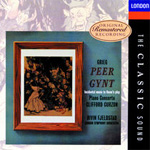 This
recording, no longer available on CD, restores not the original
couplings of these two works but a logical rearrangement of
the furniture: when last seen on LP on the Ace of Diamonds and
later the Jubilee label, the Peer Gynt music took up
a whole disc. The performances are thoroughly idiomatic –
in the case of the Piano Concerto preferable to Curzon’s
more leisurely account conducted by Fistoulari (above) –
and the recording, especially in lossless flac, still sounds
fine. At £9.99 it’s now a little more expensive than
when it was last seen on CD; go for the mp3 at £7.99 if
price is an issue. I’m very pleased to report that the
download went smoothly, with none of the problems which I reported
from passionato.com in my last Roundup. If you want a first-rate
version of both works and you are happy with 39 minutes of the
Peer Gynt music, this is for you. For all the familiarity
of ‘In the Hall of the Mountain King’, Fjeldstad’s
performance has the power to make you sit up and take notice.
This
recording, no longer available on CD, restores not the original
couplings of these two works but a logical rearrangement of
the furniture: when last seen on LP on the Ace of Diamonds and
later the Jubilee label, the Peer Gynt music took up
a whole disc. The performances are thoroughly idiomatic –
in the case of the Piano Concerto preferable to Curzon’s
more leisurely account conducted by Fistoulari (above) –
and the recording, especially in lossless flac, still sounds
fine. At £9.99 it’s now a little more expensive than
when it was last seen on CD; go for the mp3 at £7.99 if
price is an issue. I’m very pleased to report that the
download went smoothly, with none of the problems which I reported
from passionato.com in my last Roundup. If you want a first-rate
version of both works and you are happy with 39 minutes of the
Peer Gynt music, this is for you. For all the familiarity
of ‘In the Hall of the Mountain King’, Fjeldstad’s
performance has the power to make you sit up and take notice.
Gustav MAHLER (1860-1911)
Symphony No. 3 in d minor (1893-1896, rev. 1906) [104:14]
Mihoko Fujimora (alto)
Knaben des Bamberger Domchores/Werner Pees
Damen des Chores der Bamberger Symphoniker/Tobias Hiller
Bamberger Symphoniker-Bayerische Staatsphilharmonie/Jonathan
Nott
rec. live, May 2010. DDD/DSD
Texts not included
TUDOR 7170 [34:45 + 69:29] – from eclassical.com
(mp3 and lossless)
[‘Sadly, Nott’s version is … crippled …
by the kind of expressive liberties that give these symphonies
a bad name. You have been warned.’ – see review
by Dan Morgan]
Symphony No.3 in d minor [99:09]
Suite from the Works of Bach [18:54]
Petra Lang (mezzo-soprano); Netherlands Children’s Choir;
Philharmonic Choir;
Royal Concertgebouw Orchestra/Riccardo Chailly – rec.2000
and 2003. DDD.
DECCA 475 5142 [118:03] – from passionato.com
(mp3)
[mp3 box set of Symphonies 1-9 and Deryck Cook’s completion
of No.10, Decca 475 6866, also available from passionato.com]
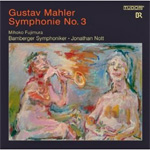
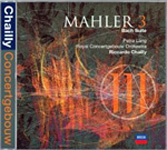 The
new Jonathan Nott recording seems set to divide critical opinion:
Dan Morgan, as you will see from the quotation above, had little
time for it, yet at least one other reviewer has made it a top
choice. In view of my tendency to find myself in agreement with
Dan whenever we do two-handed reviews, I therefore approached
it with some trepidation. On the other hand, I liked Nott’s
recording of the ‘Resurrection’ Symphony on Tudor
7158 – see June 2010 Roundup
for a comparative review of Nott and Tennsetedt – as did
Dan himself – see review
(Recording of the Month) and Gavin Dixon –
see review.
The
new Jonathan Nott recording seems set to divide critical opinion:
Dan Morgan, as you will see from the quotation above, had little
time for it, yet at least one other reviewer has made it a top
choice. In view of my tendency to find myself in agreement with
Dan whenever we do two-handed reviews, I therefore approached
it with some trepidation. On the other hand, I liked Nott’s
recording of the ‘Resurrection’ Symphony on Tudor
7158 – see June 2010 Roundup
for a comparative review of Nott and Tennsetedt – as did
Dan himself – see review
(Recording of the Month) and Gavin Dixon –
see review.
In the event I can certainly see where Dan is coming from in
his reaction to this performance – a natural reaction from
anyone who came to this work via Horenstein or Abbado. It didn’t
grab my attention as much as they do, but I still enjoyed the
performance more than he did and I’m sure that I shall
listen to the new Tudor recording.
If you wish to make up your own mind, I suggest that you listen
to the extracts from this recording available from classicsonline.com
and emusic.com and amazon.co.uk., or stream the whole symphony
from the Naxos Music Library. If you do so, pay particular attention
to your reaction to the singing, especially of Mihoko Fujimora
– as Dan suggests, this will be crucial to your acceptance
of the recording as a whole.
Emusic.com offer the download for a ridiculously inexpensive
£2.52 or less, but this is music that requires at least
the highest possible mp3 bit-rate, which emusic.com rarely offers,
so go for the lossless (flac) provided by eclassical.com for
$18.74. Return later at no extra cost for the mp3 version (at
the full 320kb/s) for your mp3 player if you wish – not
that this is the sort of music that I recommend playing in this
way. (Actually, I have to admit to being no great fan of mp3
players – even with a decent pair of over-ear ’phones,
I hardly ever use mine: it’s currently not even been charged
for a long time.)
If you find yourself in agreement with Dan Morgan’s view
of the Nott recording, you may wish to investigate Claudio Abbado
(see below). Otherwise you should be able to turn to the fairly
recent Chailly with greater confidence: this is a straight but
by no means characterless performance, presented in very good
mp3 sound by passionato.com. It comes at the full 320kb/s bit-rate,
though there’s no lossless version and, of course, you
will miss the surround channels of the SACD, apparently no longer
available, but I had no cause for complaint about the quality
of reproduction, even in the more hectic moments. The box set,
at £40.99, represents good value – the equivalent
CD set costs between £10 and £20 more. So, too,
does passionato.com’s complete DG 12-CD box set of Claudio
Abbado’s performances of Symphonies 1-9 and the Adagio
of No.10 (447
0232, mp3 only for £37.99 – the CD set sells
for twice that amount): if anything, Abbado is an even more
reliable interpreter than Chailly.
Exchange rate and VAT fluctuations have made Zubin Mehta’s
attractive version of the Third Symphony, coupled with the First
Symphony on Decca Eloquence 480 1133 less of a bargain
that when I reviewed
it three years ago, but it’s still well worth considering.
(Around £12 in the UK, which still makes the CDs less
expensive than the passionato.com mp3 download.)
Howard HANSON (1896-1981)
Symphony No. 3, Op 33 [33:12]
Elegy in Memory of Serge Koussevitsky for orchestra,
Op 44 [11:21]
Lament for Beowulf for chorus and orchestra, Op. 25 [17:38]
Eastman-Rochester Orchestra and Chorus/Howard Hanson –
rec.1957-1963. ADD.
MERCURY 434 3022 [62:11] – from passionato.com
(mp3)
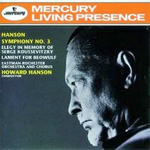 I
mentioned this in my previous Roundup in conjunction with the
new Naxos recording of Symphony No.1 and Lament for Beowulf,
but I also mentioned the unfortunate fact that all my recent
‘purchases’ from passionato.com had failed to download.
I’m happy to report that this recording presented itself
without problem, along with another stalled download, and sounds
fine. If, for all the qualities of the new version (8.559700),
you prefer the composer in his own music, you won’t be
disappointed by the performance or the mp3 transfer of a recording
in the finest vintage Mercury manner. The Eastman-Rochester
may not rank among the world’s great orchestras, but they
do a more than adequate job here.
I
mentioned this in my previous Roundup in conjunction with the
new Naxos recording of Symphony No.1 and Lament for Beowulf,
but I also mentioned the unfortunate fact that all my recent
‘purchases’ from passionato.com had failed to download.
I’m happy to report that this recording presented itself
without problem, along with another stalled download, and sounds
fine. If, for all the qualities of the new version (8.559700),
you prefer the composer in his own music, you won’t be
disappointed by the performance or the mp3 transfer of a recording
in the finest vintage Mercury manner. The Eastman-Rochester
may not rank among the world’s great orchestras, but they
do a more than adequate job here.
Miklós RÓZSA (1907-1995)
Orchestral works – Volume 1
Overture to a Symphony Concert, Op.26a (1956 rev. 1963) [9:07]
Three Hungarian Sketches, Op. 14 (1938 rev. 1958) [20:08]
Tripartita, Op. 33 (1971 rev 1972) [22:20]
Hungarian Serenade, Op. 25 (1932 rev. 1946) [22:44]
BBC Philharmonic/Rumon Gamba – rec. 2008. DDD
CHANDOS CHAN10488 [74:46] – from theclassicalshop.net
(mp3, 16- and 24-bit lossless)
[‘A lovely disc … More please and soon.’ –
see review
by Rob Barnett]
Volume 2
Variations on a Hungarian Peasant Song for violin and orchestra,
Op. 4 (1929) [10:01]
The Vintner’s Daughter – Twelve Variations on a French
Folk Song, Op. 23a (1953) [16:36]
Notturno Ungherese, Op. 28 (1964) [8:30]
Cello Concerto, Op. 32 (1967-68) [30:01]
Paul Watkins (cello); Jennifer Pike (violin)
BBC Philharmonic/Rumon Gamba – rec. June 2009 and June
2010. DDD.
CHANDOS CHAN10674 [65:40] – from
theclassicalshop.net (mp3, 16- and 24-bit lossless)
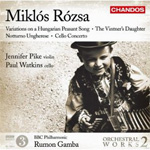 [‘High
hopes fulfilled’. – see review
by Rob Barnett]
[‘High
hopes fulfilled’. – see review
by Rob Barnett]
Two strong recommendations here for music by a composer better
known for his film music. Like Rob Barnett – follow links
above – I thought Volume 2 a worthy successor to Volume
1. If anything, the music is even more enjoyable and the performances
and recording at least equal to those on the earlier release.
I listened to the 16-bit lossless version in both cases and
found it excellent; go for the more expensive 24/96 if your
system can cope with 96kHz without down-sampling.
Miklós RÓZSA Orchestral
Music Volume III
Sinfonia Concertante, Op.29 (1966) [32:26]
Viola Concerto, Op.37 (1979) [32:44]
Igor Gruppman (violin); Paul Silverthorne (viola); Richard Bock
(cello); New Zealand Symphony Orchestra/James Sedares
KOCH INTERNATIONAL CLASSICS 3-7304-2H1 [65:11] –
from emusic.com
(mp3)
[see appreciative review
by Rob Barnett]
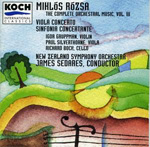 This is the least expensive of my three Rózsa recommendations
– just £2.94 from emusic.com; though the transfer
is at low bit-rates, mostly below 192kb/s, the sound is perfectly
acceptable. In any case, this download seems to be the only
way to obtain this recording in the UK and the performance of
the Viola Concerto is competitive with the recordings listed
below, while the Sinfonia Concertante is well worth hearing.
This is the least expensive of my three Rózsa recommendations
– just £2.94 from emusic.com; though the transfer
is at low bit-rates, mostly below 192kb/s, the sound is perfectly
acceptable. In any case, this download seems to be the only
way to obtain this recording in the UK and the performance of
the Viola Concerto is competitive with the recordings listed
below, while the Sinfonia Concertante is well worth hearing.
There is now something of an embarrassment of riches of recordings
of 20th-century viola concertos. Lawrence Power recorded the
Rózsa, Bartók (ed. Serly) and Serly Viola Concertos
last year in performances which I thought excellent (Hyperion
CDA67687 – see December 2010 Roundup
and review
by Jonathan Woolf). More recently James Ehnes has recorded Bartók’s
Viola Concerto (ed. Serly) alongside his two Violin Concertos
(Chandos CHAN10690 – see September 2011/1 Roundup).
I liked both of these so much that I can only recommend the
purchase of both, even though it means duplicating the Bartók
Viola Concerto; don’t ignore the Hyperion because you’ve
never heard the Serly work – it’s well worth hearing.
There’s also a Naxos recording of the Rozsa Viola Concerto
and Hungarian Serenade which I reviewed in May
2009. (NB: I wrongly said then that it was the Violin
Concerto).















